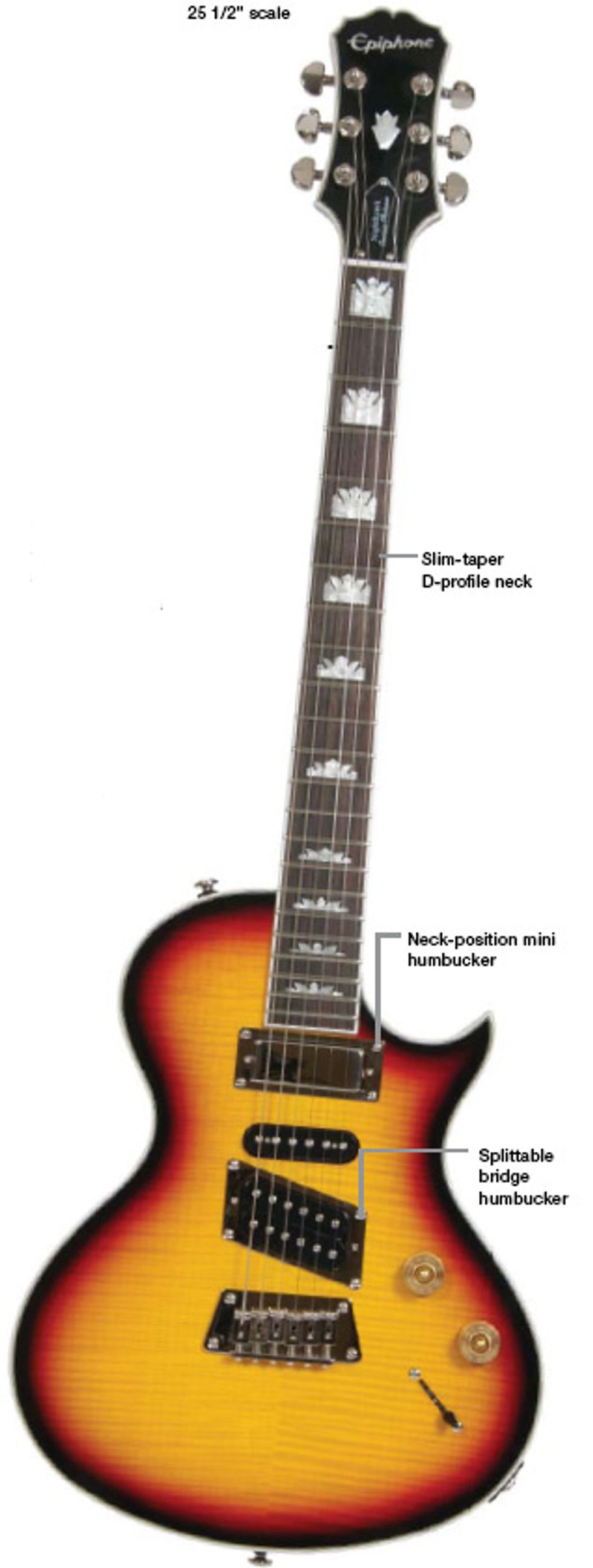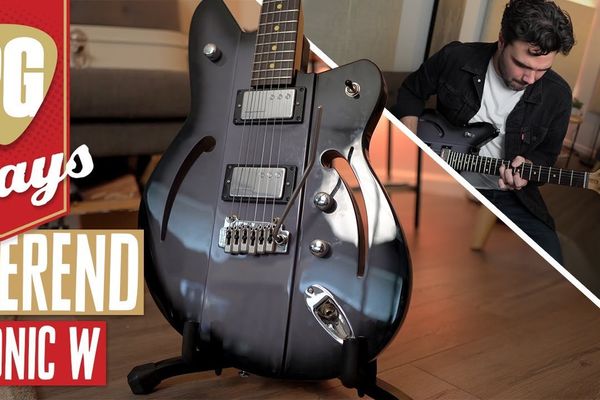Download Example 1 Clean, bridge pickup coil-tapped Download Example 2 Dirty, bridge and middle pickups Clips recorded with a 1981 Marshall JCM800 head into a Marshall JCM800 4x12 cabinet
 | |
| Download Example 1 Clean, bridge pickup coil-tapped | |
| Download Example 2 Dirty, bridge and middle pickups | |
| Clips recorded with a 1981 Marshall JCM800 head into a Marshall JCM800 4x12 cabinet (dirty) and a Fender Twin Reverb combo reissue (clean). | |
However, like so many guitars that fell prey to fashion, the Nighthawk found a dedicated cult following. And though it was eventually discontinued in 1999, demand prompted a limited-edition Gibson reissue in 2009. In the wake of the reissue’s success and the ongoing clamor for a full-fledged reissue, Epiphone has now released the same basic instrument as the Nighthawk Custom—and with a price of roughly 400 bucks, it’s likely to please longtime ’Hawk spotters and bring some new ones into the fold.
A (Neo)Classic Reborn
As previously mentioned, the Nighthawk was originally designed to be a sort of tonal Swiss Army knife, and the Epiphone incarnation marches to the same tune. The body follows the same mahogany-and-maple formula, although it’s constructed of several pieces of mahogany and the top is a beautiful flamed veneer. I was hard-pressed to find any blemishes or sloppy woodwork anywhere on the instrument.
The neck, which is capped with an ebony fretboard inlaid with a vintage-style flowerpot motif, has a slim-taper D profile. This and the Nighthawk’s longer scale are what make it feel more outside the box and less Gibson-like than what you’d expect. The longer scale length is one of the guitar’s most appealing points—the difference in feel and tone is profound. The extra 3/4" adds more string tension—making heavy bends a bit harder—but also adds a twang and snap that gives the Nighthawk a voice all its own.
The other half of the Nighthawk’s unique tone-generating recipe is its pickup configuration: an NHR mini humbucker in the neck, a NSX single-coil in the middle, and a slanted, full-size NHT humbucker in the bridge—all with alnico 2 magnets.
The Nighhawk’s playability is superb. Since its body is considerably more compact than a Les Paul’s or even an SG’s, I was able to get really comfortable with the instrument without feeling it digging into my ribs. And the longer scale and 1.68" nut add up to a neck that’s easy for chording and lead work.
Talons Full of Tone
Firing up a Fender Twin Reverb reissue, I plugged in the Nighthawk and immediately flipped to the neck pickup. When ripping out some fast chicken-pickin’ runs, I noticed the Strat-on-steroids midrange that good mini humbuckers are known for was in full effect, only with a slightly tighter bottom end. The pickup was also much hotter than I anticipated, so I dropped the guitar’s volume down to 7 to keep everything crystal clear with the Twin. The adjustment sacrificed a little harmonic detail, but the long scale’s heavier tension tended to bring out a lot of tonal definition and detail that might have otherwise been lost. And combining the mini humbucker with the middle single-coil added a really cool quack to the upper registers that was perfect for quick double stops and upbeat rhythm work.
After hearing how well the guitar handled clean tones with the neck and middle pickups, I plugged into a 1981 Marshall JCM800 head driving a 4x12 cabinet and flipped to the bridge pickup. Since the pickup is angled so that the bass-string pole pieces are closer to the neck than the treble poles, the bass strings have more low-end response and sag, while the higher strings retain more snap and sting. The effectiveness of that arrangement on the Nighthawk became super apparent once I set the Marshall up for a crunchy, mid-gain tone.
Like the neck mini humbucker, the bridge pickup’s output seemed pretty hot, and at times the output seemed to come at the expense of clarity. I lowered the pickup to open up the tone a bit, but it was difficult to find a sweet spot that didn’t sacrifice some punch. Naturally, every player’s taste is different, so some may find the pickups perfectly suited to the guitar. Others—particularly fans of the original Nighthawk who were frustrated by how the slanted pickup prevented swapping it with an after-market unit—will be glad to hear Seymour Duncan recently announced (in conjunction with Epiphone’s release of the guitar) it would be making replacement pickups for the Nighthawk in the form of the renowned ’59 and JB humbuckers. And who knows, perhaps other manufacturers will follow suit.
The Verdict
The Nighthawk Custom reissue is both a unique and capable guitar for the money, and an absolute blast to play. The tone of its bridge and neck humbuckers may not be as refined as some would like, but otherwise the guitar is solidly built and has a tone all its own—thanks mostly to the unorthodox scale length and compact body. If you’re willing to break free of the Les Paul and Strat molds, you’ll be surprised at how much it can do and how great it feels—and at a price that feels damn near a steal.
Buy if...
you crave the flexible tones and playability of the Nighthawk, but don’t have the funds for an original.
Skip if...
you prefer a shorter scale length or require a tremolo.
Rating...
Street $399 - Company Name - epiphone.com |

